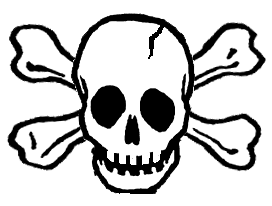
Insurance Policy
Insurance Policies were often discussed in the Articles of Piracy. Typical of such insurance policies is Article Eight of the Pirate Articles (If any man shall lose a joint in time of Engagement, shall have 400 Pieces of Eight: if a limb, 800.). While this may all sound quite democratic, I somehow suspect that it was not as fair or compensatory as it sounds. You must remember that often pirates would maroon captains because no loot was being found. I can't picture a crew of cut throats giving the lions share of a take to a wounded man, especially if that man were not well liked. Such a man may have a bit if misfortune on the operating table or perhaps his wound could become mortified and he die of disease.
Still, it was better than what was offered in most of the Navies of the day, which gave little or no compensation in the event of death or injury. Such pension plans would not exists for several decades in the Royal Navy which is often regarded as one of the more liberal Navies when it came to caring for the crew.
Battle Strategy: Some very basic concepts
One thing to remember, Pirates did not attack man-o-wars with sloops. They attacked lightly armed merchants ships with sloops. Pirate did not attack unless they had the upper hand. If they didn't think they were going to win, they didn't engage.
Two sides of the same coin. One reason a merchant would fight is if the pirates had a reputation of torturing the crew no matter if they fought or not. A reason they may not fight is because the pirates did not torture the crew unless they put up a fight.
If the merchant thought he out-gunned the pirates he may call their bluff and fight the pirates, which may lead to a pirate retreat or a slaughter of the merchant crew.
If the merchant knew he was outnumbered, he may allow his ship to be boarded in order to spare his crew. If the merchant captain feared a mutiny among his crew for engaging a fight with the pirates he may also back down and take his chances. Many things figured into why a merchant would not fight off the pirates. It is almost a given that if the pirates were outgunned, they would run and not attack. Pirates were looking for easy pickings, not an early death.
Remember that while the pirates may have had a sloop, they would also have a large crew and possibly more guns than the merchant ship they attacked. You must also remember that the merchant crews were not necessarily well paid and may not care to fight for cargo that they did not own. Thus the captain may have a very unreliable crew when it came to fighting for his property.
The pirates relied more on fear and distrust than on cannons when it came to taking on their opponents.
The Sailing Life
Day to day life on board a ship was far different that the glamorous life portrayed in an Enroll Flynn Swash-buckler movie or a Gilbert and Sullivan Musical. Upon come on board the first thing you might notice is the smell. Imagine a cross between rotting fish and human sweat. This is would be the top deck of the ship. As you went below deck, the smell would give even worse. The reason is simple. There were no real toilets on board and fresh water was an absolute luxury.
Every inch of a sailing ship would be occupied with the necessities of the voyage and every item onboard would need to be carefully stowed to prevent the cargo from moving about. If the cargo were to shift, then a the ship could easily cap-size.
Let's start at the bottom of the ship and work our way up. Between the bottom of the deck and the hull would be a space that was partially filled with stone or ballast. This area was the bilge. No matter how well a ship is constructed, water always tends to seep in. That water works its way down to the ships lowest level (the bilge) and collects there. This water brings in micro organism which die and rot in the bilge. This causes the water to turn foul which in turn leads to a horrible sewage like odor. If it were allowed to remain there, it would so weaken the bottom of the ship, that it would rot out. Thus all ships have bilge pumps which try to remove all the water from the bilge. On occasions, such as rough seas or storms, the bilge pump would be manned constantly. If it were not manned, the water would eventually fill more than just the bilge.
Manning the bilge pump was not a fun job. On many ships it would have been given as a punishment detail or given to the junior most member of the crew. The same could be the case on a pirate ship. On some ships, the bilge may have been done in shifts. The seaman who were worked the bilge pump as punishment were called bilges or bilge rats. Today the word "bilgy" means worthless and can be traced back to what most of the crew thought of the persons assigned to the bilge pump.
The sailor also had plenty of stowaways onboard the ship. Rats, fleas, and poisonous spiders and scorpions were common interlopers on ships that traveled between the Spanish Main and Europe. Fleas were inescapable. They would live within the canvas, and hide within the cracks and crevices of the the ship.
What food did pirates eat?
Food had to be brought on board for passengers and crew. Grains and flour were often stored in the lower hold and the rats would often feed better than the sailors. A major problem with rats and mice is they breed quickly, so once the infestation begins, it is almost impossible to stop it. The rats gnaw on the wood of the ships, the ropes, the food, and even the sailors. It was not uncommon for sailors to go on rat hunting trips to try and kill the vermin. On at least one occasion, a Spanish galleon reported killing over 4,000 rats in just one voyage from the Caribbean to Europe.
Often fresh fruits and vegetables, would be brought on board for food en route. Bundles of wood, for fire, would also be brought along. All of these items would also bring spiders and scorpions with them. Much of the food would rot along the way, and would just add to the odors on board.
Livestock would also be brought on board to give the sailors some fresh meat on the way. Most of this meat would be reserved for the officers on regular vessels, but it would be shared among pirate crews. But this was not the common food of the day. Most of the time, the sailors would live on hard-tack and dried meat. Hard tack is a hard cracker made of water, and flour (and sometimes a little lard). The dried meat was usually smoked pork, horse, or beef. Hard tack was so hard that it had to be soaked in water or broken into tiny bits in order to be eaten. The meat was so tough it to would often be soaked in order to eat it. The meat was also very salty.
The typical ration was about 25 ounces (@700 grams) of hard-tack and 9 ounces (@250 grams) of meat for the entire day. (Imagine working 16 hours a day and only getting about 2 1/4 pounders hamburgers patties (no bread) and a large order of french fries. Now imagine that food being smashed as flat as possible and served stale and cold. This is your entire breakfast, lunch, and dinner for the day. It would be about the same amount of food, but it would still taste better than what the sailor was eating and would also have more nutrition!)
Water was usually on short supply. A sailor might get about 1 quart (1 liter) a day of water. It was not uncommon for the water to go bad. This is why there was so much beer and rum on board ships. It was to make the water taste better and last longer. Beer, ale, and mead would all last longer than water because of the alcohol. Rum would be added to the water to help kill disease. Sailors would actually be allowed to drink more rum and beer than than water.
If that wasn't bad enough, eventually "nature" would call. Typically a sailor would use the "jardines" which was French for "gardens". Typically the jardines were near the bow of the ship. These were holes cut in a board. The sailor would lower his trousers and sit on the hole and deposit his waste in the sea. There was no privacy.
Of course everyone, even the most hardened sailor would have to visit the rail due to sea-sickness. Considering the food was often bad, as was the water, most sailors would come down with food poisoning as well as other gastrointestinal ailments. If you didn't get sea-sick, you were the rare sailor.
All in all, life on board ship was harsh. If you weren't working hard you were bored beyond belief. Sailor would often sing shanties to pass the time while working or board. The songs often contained lyrics that were anything but politically correct. Many have been passed down through the ages and still exist today.
With such a harsh and dreary life, one may wonder why anyone would ever go to sea. The answer is quite simple. Many sailors were pressed into service. This is a nice way of saying drafted. In reality they were kidnapped in the middle of the night and forced to serve on a ship. For others, life on land was just as harsh and some times even more harsh than that on the sea. The sea life, at least offered the possibility of escape from the dreariness of the day to day routines.
Sailors would turn to piracy often in an attempt to further escape this miserable existence.

The only author and editor of all pages on the site. Most of what I write about is based on years of book reading on the topic. My first web page was published back in 1994.